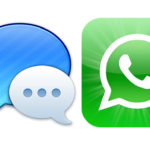 Smartphone instant messaging applications like iMessage and WhatsApp are more growing in popularity and even far outpacing traditional SMS, according to a new study from Informa.
Smartphone instant messaging applications like iMessage and WhatsApp are more growing in popularity and even far outpacing traditional SMS, according to a new study from Informa.
In 2012, on average 19.1 billion messages were sent and received each day over the six most popular mobile chat applications, including Blackberry Messenger, Nimbuzz, Apple’s iMessage, KakaoTalk, WhatsApp, and Viber. Informa estimates that 17.6 billion SMS messages were sent each day during the same year.
Texting has become the new way people communicate – years ago replacing telephone calls and even email. But more and more people seem unwilling to pay pricey texting plans, so they are opting for free applications that give them unlimited texting plans that allow them to communicate for free with anyone across the world – no matter what type of phone they have.
Informa predicts the chat app messages to double by the end of this year. The number of chat app messages sent each day will rise to 41 billion per day, compared with an average of 19.5 billion SMS messages, the study said.
So if more people are using free messaging applications does that spell doom for traditional texting? Not anytime soon, according to the report.
The increasing use of free messaging applications could hit the bottom line of mobile carriers. As more people use chat applications, less people use SMS, and that has already had a major impact on revenues in Spain, the Netherlands, and South Korea.
According to Informa, SMS revenues in Spain have declined from 1.1 billion Euros in 2007 to 758.5 million Euros in 2011. But Informa believes that SMS revenue and traffic will continue to increase through 2016.
“The adoption and use of [over-the-top] messaging apps is far from universal,” Pamela Clark-Dickson, senior analyst at Informa Telecoms & Media, said in a blog post. “…SMS is starting to hit its stride in the enterprise mobile messaging market.”
